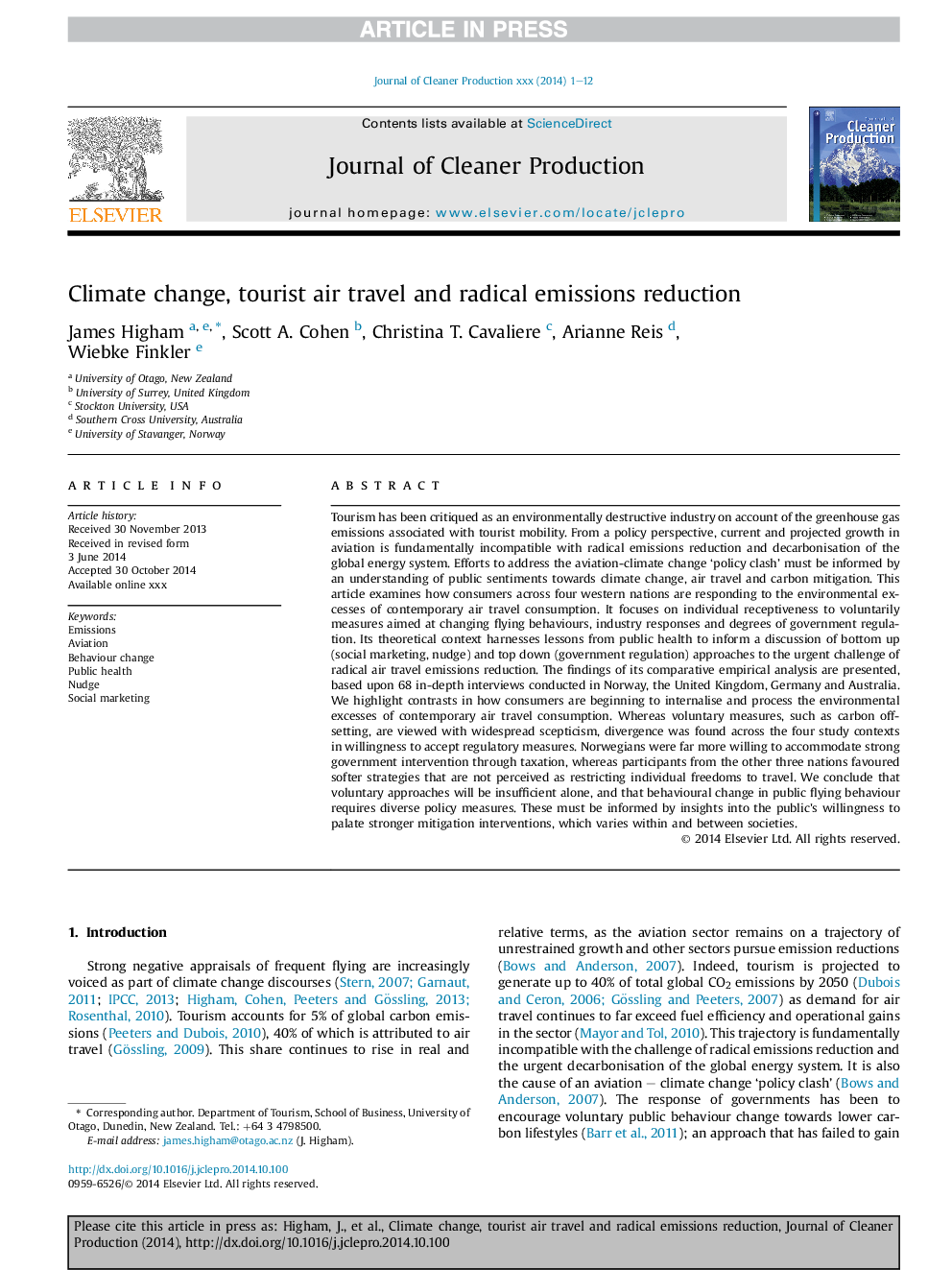| کد مقاله | کد نشریه | سال انتشار | مقاله انگلیسی | نسخه تمام متن |
|---|---|---|---|---|
| 10688112 | 1017977 | 2016 | 12 صفحه PDF | دانلود رایگان |
عنوان انگلیسی مقاله ISI
Climate change, tourist air travel and radical emissions reduction
ترجمه فارسی عنوان
تغییرات اقلیمی، مسافرت هوایی و کاهش انتشار رادیکال
دانلود مقاله + سفارش ترجمه
دانلود مقاله ISI انگلیسی
رایگان برای ایرانیان
کلمات کلیدی
انتشارات، هواپیمایی، تغییر رفتار، سلامت عمومی، بریدن بازاریابی اجتماعی،
ترجمه چکیده
گردشگری به عنوان یک صنعت مخرب زیست محیطی به دلیل انتشار گازهای گلخانه ای مرتبط با تحرک گردشگری مورد انتقاد قرار گرفته است. از دیدگاه سیاست، رشد فعلی و پیش بینی شده در حمل و نقل هوایی اساسا با کاهش انتشار رادیکال و کاهش انرژی در سیستم جهانی انرژی ناسازگار است. با درک احساسات عمومی نسبت به تغییرات اقلیمی، مسافرت هوایی و کاهش میزان کربن، باید تلاش هایی برای مقابله با خطرات هوافضا و تغییرات آب و هوایی صورت گیرد. این مقاله بررسی چگونگی مصرف مصرف کنندگان در چهار کشور غربی را در ارتباط با اضطراب محیط زیست مصرف هواپیما معاصر مطرح می کند. این تمرکز بر حساسیت فرد به اقدامات داوطلبانه جهت تغییر رفتارهای پرواز، پاسخ های صنعت و مقررات دولتی است. چارچوب نظری آن، درس هایی را از سلامت عمومی به منظور اطلاع رسانی به بحث از پایین به پایین (بازاریابی اجتماعی، پرش) و بالا به پایین (مقررات دولتی) رویکرد به چالش فوری کاهش کاهش انتشارات رادیال هواپیما است. یافته های آنالیز تجربی مقایسه ای بر اساس 68 مصاحبه عمیق در نروژ، انگلستان، آلمان و استرالیا ارائه شده است. ما کنتراست را در چگونگی مصرف مصرف کنندگان درونی و فرایندهای اضافی محیط زیست در مصرف هواپیما معاصر برجسته می کنیم. در حالی که اقدامات داوطلبانه، مانند کربن خاموش، با شک و تردید گسترده ای مشاهده می شود، در تمام چهار زمینه مطالعات در تمایل به پذیرش اقدامات نظارتی، تفاوت وجود دارد. نروژی ها بیشتر مایل به پذیرش مداخله قوی دولت از طریق مالیات بودند، در حالی که شرکت کنندگان از سه کشور دیگر از استراتژی های نرم تر تر هستند که به عنوان محدود کردن آزادی های فردی برای سفر به نظر نمی رسید. ما نتیجه گرفتیم که رویکردهای داوطلبانه به تنهایی کافی نیستند و تغییر رفتار در رفتار پرواز عمومی نیاز به اقدامات متنوع سیاسی دارد. این ها باید از طریق بینش ها در مورد تمایل مردم به سوء استفاده از مداخلات مداخله ضعف رو به افزایش، که در داخل و بین جوامع متفاوت است، مطلع شوند.
موضوعات مرتبط
مهندسی و علوم پایه
مهندسی انرژی
انرژی های تجدید پذیر، توسعه پایدار و محیط زیست
چکیده انگلیسی
Tourism has been critiqued as an environmentally destructive industry on account of the greenhouse gas emissions associated with tourist mobility. From a policy perspective, current and projected growth in aviation is fundamentally incompatible with radical emissions reduction and decarbonisation of the global energy system. Efforts to address the aviation-climate change 'policy clash' must be informed by an understanding of public sentiments towards climate change, air travel and carbon mitigation. This article examines how consumers across four western nations are responding to the environmental excesses of contemporary air travel consumption. It focuses on individual receptiveness to voluntarily measures aimed at changing flying behaviours, industry responses and degrees of government regulation. Its theoretical context harnesses lessons from public health to inform a discussion of bottom up (social marketing, nudge) and top down (government regulation) approaches to the urgent challenge of radical air travel emissions reduction. The findings of its comparative empirical analysis are presented, based upon 68 in-depth interviews conducted in Norway, the United Kingdom, Germany and Australia. We highlight contrasts in how consumers are beginning to internalise and process the environmental excesses of contemporary air travel consumption. Whereas voluntary measures, such as carbon off-setting, are viewed with widespread scepticism, divergence was found across the four study contexts in willingness to accept regulatory measures. Norwegians were far more willing to accommodate strong government intervention through taxation, whereas participants from the other three nations favoured softer strategies that are not perceived as restricting individual freedoms to travel. We conclude that voluntary approaches will be insufficient alone, and that behavioural change in public flying behaviour requires diverse policy measures. These must be informed by insights into the public's willingness to palate stronger mitigation interventions, which varies within and between societies.
ناشر
Database: Elsevier - ScienceDirect (ساینس دایرکت)
Journal: Journal of Cleaner Production - Volume 111, Part B, 16 January 2016, Pages 336-347
Journal: Journal of Cleaner Production - Volume 111, Part B, 16 January 2016, Pages 336-347
نویسندگان
James Higham, Scott A. Cohen, Christina T. Cavaliere, Arianne Reis, Wiebke Finkler,
